It is a principle that ensures Malta does not serve as a base for any foreign military power and that our armed forces remain dedicated solely to defending our sovereignty rather than engaging in foreign conflicts.
While Malta does not exist in a vacuum, the EU’s efforts to strengthen its strategic position must not come at the expense of our neutrality.
Malta’s foreign policy has long been rooted in non-alignment, and this principle should remain central to any discussions on defense spending.
Investment in national security must be guided by Malta’s specific needs rather than influenced by external pressures or geopolitical shifts.
The evolving global order presents new challenges, and the way certain powers assert their influence—such as the United States’ approach toward Greenland, which appears to sideline Denmark despite its NATO membership—clearly illustrates how alliances are being tested.
This shift is unsettling the traditionally strong transatlantic partnership that underpins the Western geopolitical framework.
Within the European Parliament, I sense growing uncertainty and an urgent need to formulate a strategic response, particularly among my colleagues from the Baltic states and the Visegrád Group.
The shifting balance of power requires careful navigation, but any path forward must uphold Malta’s constitutional commitment to neutrality.
Neutrality does not equate to isolation or a lack of defense investment. On the contrary, a strong and well-equipped national defense is essential for protecting our sovereignty.
However, as a matter of principle, I share the Prime Minister’s stance that Maltese forces should not be drawn into foreign conflicts. Their primary duty is to safeguard our nation—not to serve as participants in proxy wars.

